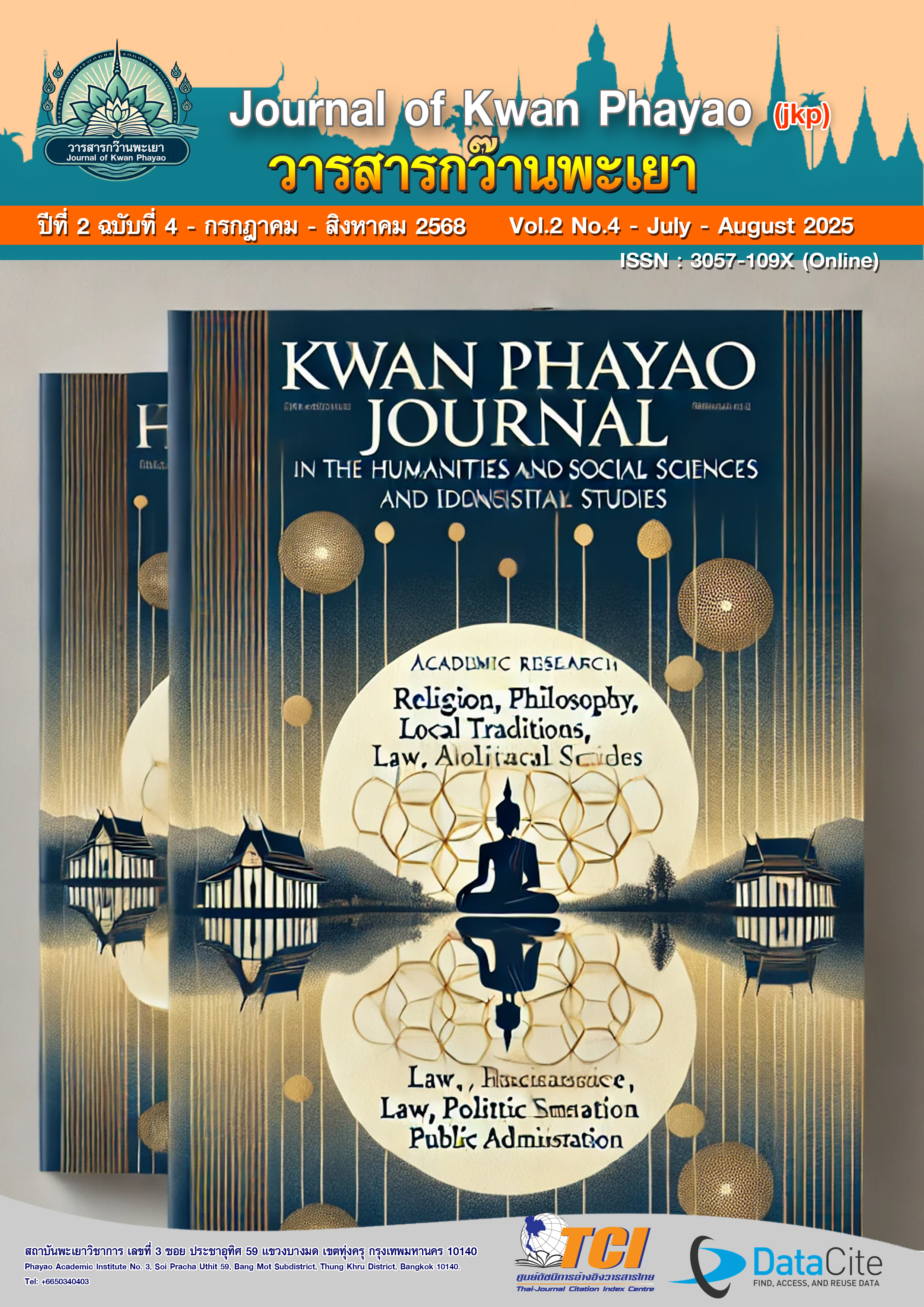พลังของเครือข่ายสังคมออนไลน์ต่อการมีส่วนร่วมทางการเมืองในสังคมไทยร่วมสมัย
คำสำคัญ:
เครือข่ายสังคมออนไลน์, การมีส่วนร่วมทางการเมือง, พลเมืองเครือข่าย ประชาธิปไตยดิจิทัล, ไทยบทคัดย่อ
บทความนี้มุ่งวิเคราะห์บทบาทและพลังของเครือข่ายสังคมออนไลน์ที่มีต่อการมีส่วนร่วมทางการเมืองในสังคมไทยร่วมสมัย โดยอธิบายผ่านกรอบทฤษฎีการมีส่วนร่วมทางการเมือง แนวคิดพื้นที่สาธารณะของ Habermas และทฤษฎีสื่อใหม่กับประชาธิปไตยดิจิทัล ผลการศึกษาแสดงให้เห็นว่าเครือข่ายสังคมออนไลน์เป็นปัจจัยสำคัญที่เปลี่ยนรูปแบบการเมืองไทยจากออฟไลน์สู่ดิจิทัล ทำให้ประชาชนโดยเฉพาะเยาวชนและนักศึกษาเข้ามามีบทบาทมากขึ้นผ่านการใช้ Twitter และ Facebook รวมถึงการเคลื่อนไหวผ่านแฮชแท็กทางการเมือง เช่น #เยาวชนปลดแอก และ #saveบางกลอย ซึ่งไม่เพียงขยายประเด็นในประเทศให้เป็นที่รับรู้ แต่ยังเชื่อมโยงเข้าสู่การเมืองระดับนานาชาติ นอกจากนี้ยังเกิดพลเมืองเครือข่ายที่มีความสามารถในการสร้างสรรค์วาทกรรมและกำหนดวาระสาธารณะใหม่ ส่งผลให้การเมืองไทยมีลักษณะใกล้เคียงกับประชาธิปไตยแบบมีส่วนร่วมมากขึ้น อย่างไรก็ตาม ปัญหาการบิดเบือนข้อมูล ข่าวปลอม ความแตกแยกทางสังคม และการควบคุมโดยรัฐยังคงเป็นข้อจำกัดที่ท้าทายต่อการพัฒนาประชาธิปไตยดิจิทัลในอนาคต
เอกสารอ้างอิง
Aim, S. (2020). Hashtag activism and youth movement in Thailand. Journal of Social Issues in Southeast Asia, 35(2), 145–167.
Bennett, W. L., & Segerberg, A. (2012). The logic of connective action: Digital media and the personalization of contentious politics. Information, Communication & Society, 15(5), 739–768.
Boulianne, S. (2015). Social media use and participation: A meta-analysis of current research. Information, Communication & Society, 18(5), 524–538.
Castells, M. (2012). Networks of outrage and hope: Social movements in the Internet age. Polity.
Chadwick, A. (2017). The hybrid media system: Politics and power (2nd ed.). Oxford University Press.
Chaiyan, R. (2021). Political communication in Thailand’s digital age. Asian Journal of Communication, 31(4), 312–329.
Coleman, S., & Blumler, J. G. (2009). The Internet and democratic citizenship: Theory, practice and policy. Cambridge University Press.
Dahlgren, P. (2009). Media and political engagement: Citizens, communication, and democracy. Cambridge University Press.
Gillespie, T. (2018). Custodians of the Internet: Platforms, content moderation, and the hidden decisions that shape social media. Yale University Press.
Habermas, J. (1989). The structural transformation of the public sphere: An inquiry into a category of bourgeois society. MIT Press.
Held, D. (2006). Models of democracy (3rd ed.). Stanford University Press.
Howard, P. N., & Hussain, M. M. (2013). Democracy’s fourth wave? Digital media and the Arab Spring. Oxford University Press.
Human Rights Watch. (2021). Thailand: Cybersecurity law endangers rights. Retrieved from https://www.hrw.org/
Kaewthep, K. (2020). Youth movements and online political communities in Thailand. Journal of Communication and Society, 18(2), 55–77.
Kaplan, A. M., & Haenlein, M. (2010). Users of the world, unite! The challenges and opportunities of social media. Business Horizons, 53(1), 59–68.
Kuner, C. (2017). The General Data Protection Regulation: A commentary. Oxford University Press.
Lee, F. L. F., & Ting, H. (2015). Media and protest logics in the digital era: The Umbrella Movement in Hong Kong. Chinese Journal of Communication, 8(4), 353–375.
Livingstone, S. (2004). Media literacy and the challenge of new information and communication technologies. Communication Review, 7(1), 3–14.
McCargo, D. (2019). Thai politics: Between democracy and its discontents. NIAS Press.
McCargo, D. (2020). Future forward: The rise and fall of a Thai political party. NIAS Press.
McNair, B. (2018). An introduction to political communication (6th ed.). Routledge.
Sinpeng, A. (2021). Digital media, political authoritarianism, and Internet controls in Southeast Asia. Democratization, 28(1), 1–19.
Sinpeng, A., & Sullivan, J. (2020). Social media and political participation in Thailand. In Digital Asia (pp. 115–133). Routledge.
Sirivunnabood, P. (2020). Cyber politics in Thailand: The role of information operations. ISEAS Perspective, 45, 1–12.
Sunstein, C. R. (2018). #Republic: Divided democracy in the age of social media. Princeton University Press.
Suwannakij, P. (2021). Digital citizenship and youth politics in Thailand. Journal of Contemporary Asia, 51(5), 789–808.
Tucker, J. A., Theocharis, Y., Roberts, M. E., & Barberá, P. (2017). From liberation to turmoil: Social media and democracy. Journal of Democracy, 28(4), 46–59.
Verba, S., Schlozman, K. L., & Brady, H. E. (1995). Voice and equality: Civic voluntarism in American politics. Harvard University Press.
Yang, G. (2016). Narrative agency in hashtag activism: The case of #BlackLivesMatter. Media and Communication, 4(4), 13–17.




